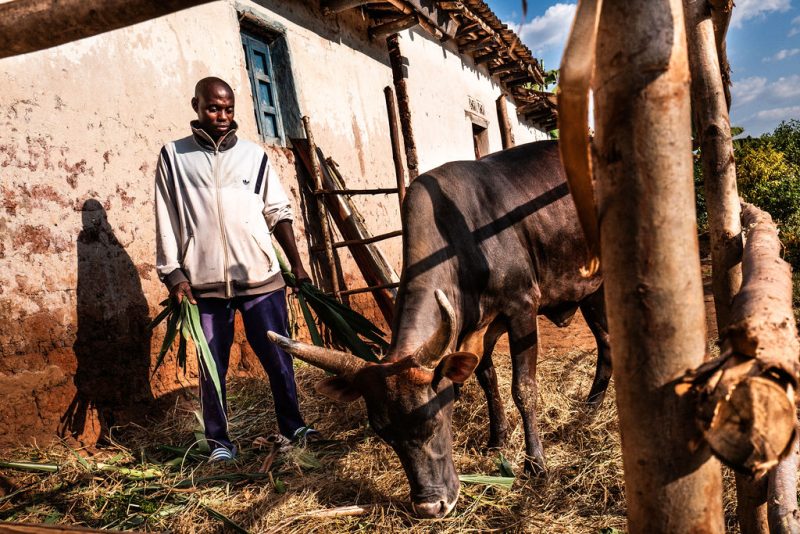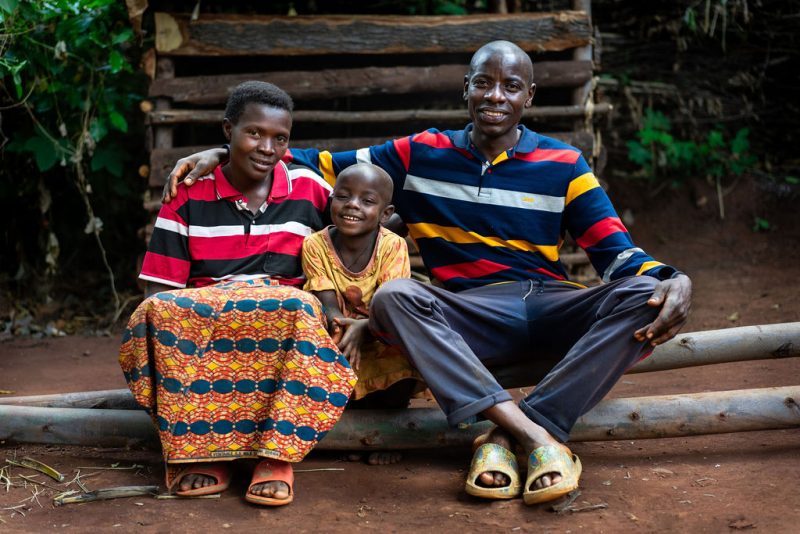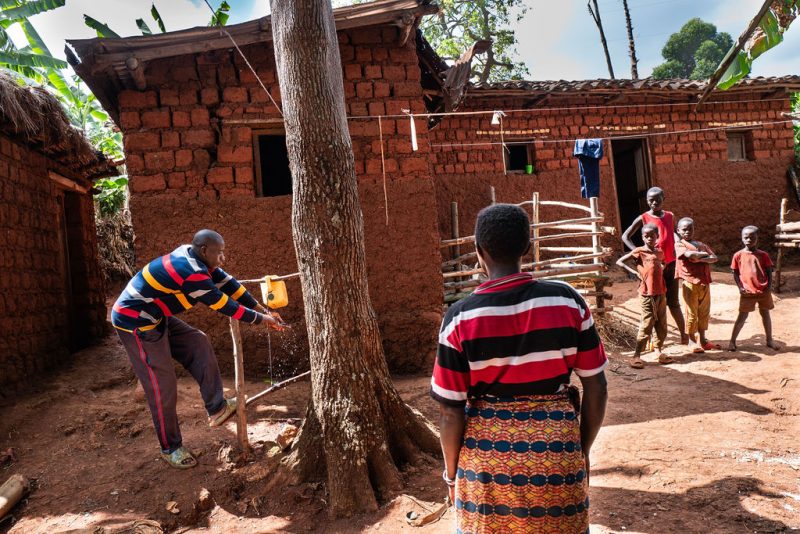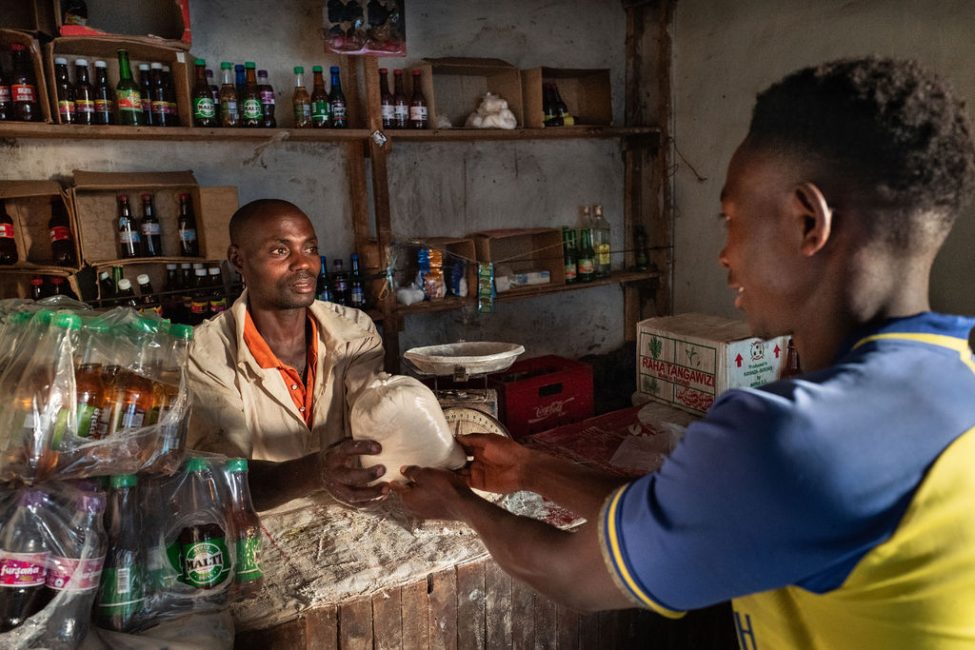At 42 years old, Claude Nduwimana owns a business, two houses, cattle and a handful of plots of land on which he employs several people. An atypical route on the Mugomera hill, in the province of Ngozi, where most of the population lives below the poverty line. His success is all the more impressive given that the father of the family had nothing or almost nothing just four years ago.
Last March, he moved with his wife and six children to his new house, which he had built at the back of his shop on a shopping street in the centre of Mugomera. The symbol of a success he had been waiting for since obtaining his 300,000 francs loan (about 100 euros) in 2020. At the time, when he was on our waiting list to receive goats via the chain of solidarity, Claude heard about our livestock credit program. And his choice was quickly made.
Entrepreneurship thanks to livestock credit

Claude, 42, recently moved to a new building at the back of his shop. He has transformed his old house into a stable for his cow and goats. © Loïc Delvaulx
Claude has always had a commercial flair: when he took out his first loan, he had already been running his business for more than five years. But at the time, the shop did not belong to him. He had associates and had to apply for credit to buy his goods. He owned a few fields, but they didn’t bring in much, just enough to feed his family. On the other hand, they were very useful to him to serve as a guarantee with the local microfinance institution.
With his loan in hand, Claude bought a goat and used the rest of the money to expand his business. One thing leading to another, the trader bought more goats whose manure he used to fertilize his fields and increase his harvests. The sale of his agricultural surpluses allowed him to buy a cow and increase the capital of his shop. Behind the counter, there is now tea, flour and drinks, but also homemade doughnuts that his customers can enjoy in a small restaurant in the adjoining room.
Goat farming, a springboard to access credit

Thanks to Vétérinaires Sans Frontières, Donatien and his family received goats and benefited from a breeding loan. Today, he plans to build a shop to sell their agricultural production. © Loïc Delvaulx
A few kilometres away, on Mutumba Hill, Donatien Ndagijimana, 35, is well on his way to following the same path. Building a shop is also his dream, but he would rather sell his agricultural production there. It must be said that he has never had such good harvests: each season, he can count on an average production of 500 kg of maize and 350 kg of beans. Returns that he could never have imagined a few years ago. Before receiving goats and benefiting from the support of Veterinarians Without Borders, he harvested barely 80 kg of beans and 20 kg of maize. In addition to the income he generates from his crops, manure also brings him a significant sum: in one year, his animals allow him to produce six skips of organic manure. By selling half of it, he earned 240,000 francs. Money that allows him to employ about twenty people on his fields, as well as a cattle dog.
“I was lucky enough to receive my pregnant goats. After a few months, they all gave birth,” says the young father, whose situation changed quickly. A year later, in 2018, he learned about the possibility of taking out a loan through the NGO and its partner UCODE-AMR. After an accelerated training in management, he received a loan of 300,000 Burundian francs.
Diversifying your income, the key to always bouncing back

Donatien and his wife, at the back of their house in Mutumba, where they raise goats, a cow and a pig. © Loïc Delvaulx
Since then, the young entrepreneur has skilfully juggled between loans, breeding and investments, and it has been successful. “At the time I received my loan, my goats had five kids, and I sold them for 250,000 francs. With this money and what I had borrowed, I bought a calf. Once adult, this cow also had a calf; I waited until he was an adult and sold him for 800,000 francs. This allowed me to buy a plot of land for 500,000 francs and to take out another loan of 300,000 francs, which I repaid with interest in one year. »
After opening his business, Donatien plans to buy a motorcycle to get around. He would also like to install a solar panel to light his house and allow his children to study easily inside. He intends to have them educated up to university, in Burundi and even abroad.
For his part, Claude does not intend to stop there either. The entrepreneur has a lot of ideas: when he can, he will replace his bike with a motorcycle or even a car to become a taxi driver. A new string to his bow to diversify his income even more, as our hosts have taught him to do.
To find out more about our livestock credit programme and our approach in Burundi, read our factsheet.

